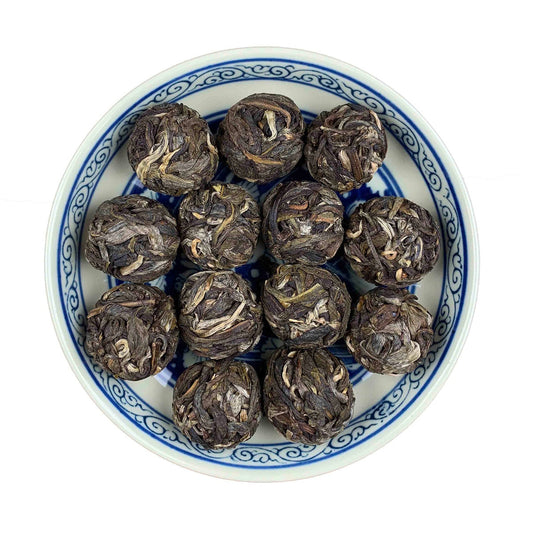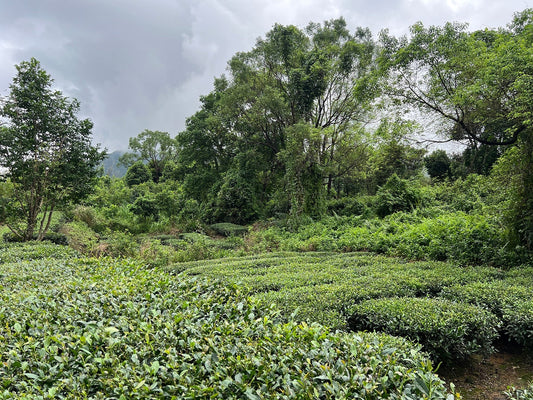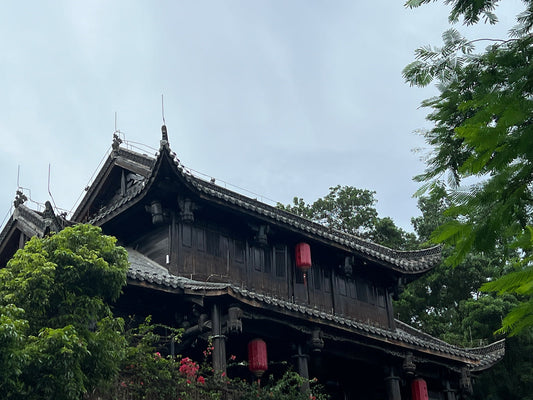Introduction to Gongfu Tea Brewing and Chinese Green Tea
For tea enthusiasts, the art of Gongfu tea brewing is a meditative and immersive experience that unlocks the full potential of high-quality teas. Among the many varieties of tea, Chinese Green Tea stands out for its fresh, delicate, and complex flavors. Today, we embark on a journey to explore a rare and exquisite tea—Spring Wild-Harvested Chinese Aged Green Tea—using traditional Gongfu brewing techniques.

This tea is sourced from high-altitude regions, where the cool climate, pristine air, and fertile soil contribute to its unique character. The aging process further enhances its depth, creating a harmonious balance of roasted, floral, and nutty notes. Through Gong fu tea brewing, we will uncover the layers of flavor and aroma that make this tea truly special.
The Art of Gongfu Tea Brewing
What is Gongfu Tea Brewing?
Gongfu tea brewing (功夫茶) is a traditional Chinese method of preparing tea that emphasizes precision, patience, and appreciation. Unlike Western-style brewing, which often involves steeping tea leaves for several minutes in a large pot, Gongfu tea brewing uses small teaware (such as a Gaiwan or Yixing clay teapot) and multiple short infusions to extract the tea’s full essence.

Why Use Gongfu Brewing for Chinese Green Tea?
While Chinese Green Tea is often brewed using simpler methods, Gongfu tea brewing allows for a more nuanced tasting experience. By controlling water temperature, steeping time, and leaf-to-water ratio, we can:
- Enhance aroma complexity – Short, successive infusions reveal evolving floral, vegetal, and roasted notes.
- Control astringency – Prevents over-extraction, preserving the tea’s natural sweetness.
- Appreciate texture – Each infusion offers a different mouthfeel, from silky to brisk.

Discovering Spring Wild-Harvested Chinese Aged Green Tea
Origin and Characteristics
This Chinese Green Tea is a wild-harvested, aged variety from high-elevation tea gardens. Key features include:
- Wild-grown leaves – Naturally resilient, with deeper flavor complexity.
- Spring harvest – The first flush yields the freshest, most vibrant leaves.
- Aging process – Gentle roasting and storage develop a rich, layered profile.

First Impressions: Dry Leaves
Upon opening the package, I was greeted by an intoxicating roasted aroma with hints of baked bread and dried flowers. The leaves displayed a mix of deep green and brown hues, glistening with a natural sheen—a testament to careful craftsmanship.
Gongfu Tea Brewing Step-by-Step
Equipment Needed
- Gaiwan (or small teapot) – For precise brewing.
- Fairness pitcher (Cha Hai) – Ensures even infusion.
- Small tasting cups – Enhances aroma perception.
Brewing Parameters
- Water temperature: 100°C (212°F) – Prevents bitterness.
- Leaf-to-water ratio: 5g per 100ml.
-
Steeping time:
First infusion: 6 seconds (awakens the leaves).
Subsequent infusions: +3 seconds each round.
The Brewing Process
1. Warming the Teaware
Rinsing the Gaiwan and cups with hot water ensures even heat distribution.
2. Awakening the Tea (First Rinse)
A quick 5-second rinse with hot water removes impurities and prepares the leaves for brewing. The discarded rinse water releases an initial burst of roasted and floral aromas.
3. First Infusion (6 sec)
The liquor pours a light golden yellow, clear and bright. The aroma is warm and toasty, with subtle floral undertones.
Tasting Notes:
- Flavor: Smooth, with a dominant roasted character.
- Aftertaste: A lingering sweetness emerges, reminiscent of honey.
4. Second Infusion (3 sec)
The leaves begin to unfurl, releasing more nutty and vegetal notes.
Tasting Notes:
- Mouthfeel: Silky and rounded.
- Aroma: Hints of chestnut and fresh grass.
5. Third to Fifth Infusions (20-30 sec each)
The tea evolves with each steep:
- Third infusion: More floral.
- Fourth infusion: Balanced roast and sweetness.
- Fifth infusion: Delicate, mineral finish.

Flavor Profile and Sensory Experience
Aroma Evolution
- Dry leaves: Roasted bread, dried flowers.
- Wet leaves: Toasted nuts, fresh vegetation.
- Liquor: Honeyed, with a floral bouquet.
Taste and Texture
- Initial sip: Warm, roasted depth.
- Mid-palate: Floral and nutty layers.
- Finish: Clean, sweet, and refreshing.
Aftertaste (Hui Gan 回甘)
A hallmark of high-quality Chinese Green Tea is its lingering sweetness. This tea leaves a pleasant, honey-like aftertaste that lasts minutes after drinking.

Why This Tea Stands Out
1. Wild-Harvested Purity
Unlike cultivated teas, wild tea plants grow naturally, developing more complex flavors due to environmental stress.
2. Aging Enhances Depth
While most green teas are consumed fresh, aged green tea undergoes subtle oxidation, adding richness and smoothness.
3. High-Altitude Influence
The cool mountain climate slows leaf growth, increasing amino acids (L-theanine) for a sweeter, umami-rich taste.

Cost-Performance Ratio: Is It Worth It?
For tea lovers seeking premium Chinese Green Tea, this wild-harvested aged variety offers exceptional value. Compared to other high-mountain teas, it provides:
- Greater complexity due to aging.
- Longer-lasting infusions (8+ steeps with Gongfu brewing).
- Unique roasted-floral balance not found in standard greens.
Final Thoughts: A Must-Try for Tea Connoisseurs
Through Gongfu tea brewing, we’ve uncovered the hidden depths of this Spring Wild-Harvested Chinese Aged Green Tea. Its evolving aromas, layered flavors, and lingering sweetness make it a standout among Chinese Green Teas.

Why You Should Try It
✔ Perfect for Gongfu brewing – Unlocks full flavor potential.
✔ Unique aged character – Rare among green teas.
✔ Exceptional aftertaste – Sweet, floral, and satisfying.
For those looking to expand their Chinese Loose Leaf tea collection, this tea is a must-experience. Brew it with care, savor each sip, and let it transport you to the misty mountains where it was born.
Conclusion: A Journey Worth Taking
Exploring tea through Gongfu brewing is more than a ritual—it’s a celebration of craftsmanship and nature. This Spring Wild-Harvested Chinese Aged Green Tea exemplifies the beauty of traditional Chinese tea culture, offering a multi-sensory experience that lingers long after the last cup.



